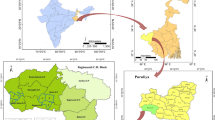Abstract
Saskia Ivens examines the extent to which women have benefited from increased water access. She argues that while gender equality is crucial for the sustainability of water programmes, its advancement through water programmes has been limited. She calls for more impact studies and suggests the use of empowering participatory approaches.
Similar content being viewed by others
References
Bell, Emma (2001) Water for Production: An overview of the main issues and collection of supporting resources, Sussex: IDS.
CIDA (1997) Guide to Gender-Sensitive Indicators, Hull: CIDA.
CIDA (1999) CIDA's Policy on Gender Equality, Hull: CIDA.
Cleaver, Frances (2003) ‘Bearers, Buyers and Bureaucrats: The missing social world in gender and water’, paper prepared for the workshop ‘Feminist Fables and Gender Myths: Repositioning Gender in Development Policy and Practice’, Sussex, United Kingdom, 2–4 July.
Crow, Ben and Farhana Sultana (2002) ‘Gender, Class, and Access to Water: Three cases in a poor and crowded delta’, Society and Natural Resources 15: 709–724.
Fisher, Julie (2006) For Her it is the Big Issue: Putting women at the centre of water supply, sanitation and hygiene, Geneva: WSSCC and WEDC.
GWA (2003) The Gender and Water Development Report 2003: Gender perspectives on policies in the water sector, Leicestershire: WEDC.
GWA and UNDP (2006) Resource Guide: Mainstreaming gender in water management, Dieren: GWA.
Khosla, Prabha (2003) ‘Tapping into Sustainability: Issues and trends in gender mainstreaming in water and sanitation’, background document prepared for the Gender and Water Session of the ‘Third World Water Forum’, Kyoto, Japan, 2003.
Khosla, Prabha and Rebecca Pearl (2003) Untapped Connections: Gender, poverty and water, New York: WEDO.
Lahiri-Dutt, Kuntala (2007) ‘Diluted Citizenship: Women, water and rights in the midst of inequities in India’, Participatory Development Working papers No 07/02.
Shrestha, Rajendra B. (2002) ‘Pro-Poor Water Supply and Sanitation Project: The RWSSP experience from Nepal’, paper prepared for the ‘Water and Poverty Regional Consultative Meeting’, Dhaka, Bangladesh, 22–26 August 2002.
Smirat, Samira (2006) ‘Role of Women in Water Management and Conservation in Jordan’, unpublished report, Jordan: IDRC.
UN (1996) The Beijing Declaration and The Platform for Action, New York: Department of Public Information UN.
UNDP (2006) Human Development Report 2006: Beyond scarcity: Power, poverty and the global water crisis, New York: UNDP.
UN Millennium Project Task Force on Water and Sanitation (2005) Health, Dignity, and Development: What will it take? Abridged edition, Stockholm: SIWI.
UN OSAGI (2006) Gender, Water and Sanitation: Case studies on best practices, New York: UN.
Upadhyay, Bhawana (2005) ‘Women and Natural Resource Management: Illustrations from India and Nepal’, Natural Resources Forum 29: 224–232.
Van Wijk-Sijbesma, Christine (1998) Gender in Water Resources Management, Water Supply and Sanitation: Roles and realities revisited, Delft: IRC.
WaterAid (2001) Looking Back: The long-term impacts of water and sanitation projects, London: WaterAid.
Well (2005) The Gender Millennium Development Goal: What water, sanitation and hygiene can do in India, Leicestershire: WEDC.
Acknowledgements
I express my sincere thanks to Heather Miller and George Yap (WaterCan) for their review of this article.
Additional information
Looks at the gender dimension of water management
Rights and permissions
About this article
Cite this article
Ivens, S. Does Increased Water Access Empower Women?. Development 51, 63–67 (2008). https://doi.org/10.1057/palgrave.development.1100458
Published:
Issue Date:
DOI: https://doi.org/10.1057/palgrave.development.1100458




